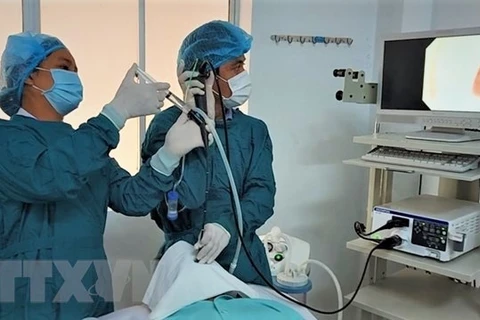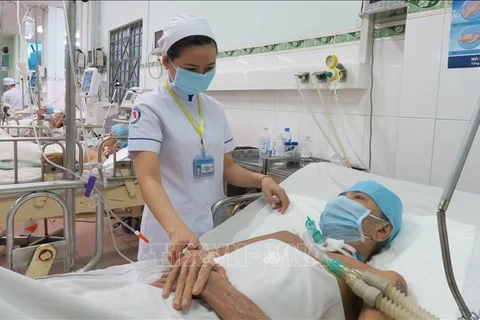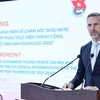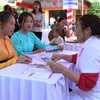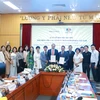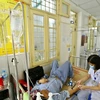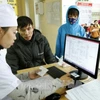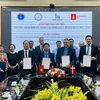 President Nguyen Xuan Phuc (right, first row) gives the Hồ Chí Minh Award to Associate Professor Nguyen Viet Nhung.(Photo suckhoedoisong.vn)
President Nguyen Xuan Phuc (right, first row) gives the Hồ Chí Minh Award to Associate Professor Nguyen Viet Nhung.(Photo suckhoedoisong.vn) They have saved the lives of thousands who suffered from multidrug-resistant and super-multidrug-resistant TB patients.
The project on research and application of advanced techniques in respiratory diseases diagnosis and treatment in Vietnam, by associate professor Nguyen Viet Nhung, director of the National Lung Hospital and 22 co-authors received the Ho Chi Minh award.
The project includes 23 sub-researches.
The research results have been applied over three years to solve very difficult respiratory problems in Vietnam.
They applied advanced techniques for TB screening, early diagnosis and detection in the community.
It helped treat TB 44% faster than earlier methods.
"It is proof of the feasibility of the goal of ending TB globally," Nhung said.
The project's results have inspired the global TB community with a breakthrough 2X (X-ray and Xpert) screening strategy to improve TB detection.
The 2X screening strategy was implemented quickly due to the COVID-19 pandemic, but it diagnosed and further treated 2,854 TB patients in the community.
The proportion of TB patients detected is 1,248 per 100,000 people, much higher than the estimated national rate of 322 per 100,000.
Nhung said that dozens of studies drew up the model over many years. It gave Vietnam the position of a leading country and proposed to the World Health Organization (WHO) strategic advisory council to spread the model on a global scale.
The successful application of advanced techniques for screening, early diagnosis and development of new TB treatment has reduced the burden of TB in Vietnam with a reduction of 4.5% per year compared to 1.5% per year globally.
The death rate in 2020 has decreased by 34% compared to 2015.
The reduction of TB disease in the past ten years has saved 8.7 trillion VND (354.2 million USD), equivalent to preventing 284,000 new TB patients if no preventive measures were taken.
First time
Associate professor Nhung said the project's speciality was that it established a lot of "first times".
The project was conducted all over the country, with hundreds of thousands of people joining from central to local levels. It was the first time they carried out research with a large sample scale of nearly 100,000 people.
For the first time in Vietnam, after 40 years of TB treatment history, the group has successfully researched and set up a four-month TB treatment period, which was an important step to ending TB globally.
Shortening the treatment time to only two-thirds of the current period reduced the risk of serious side effects and improved treatment quality.
From this project, said Nhung, for the first time in Vietnam, a lung lobe transplant from a live donor was successful with favourable anti-rejection treatment results.
Even in countries with a developed medical system, monitoring and treating transplant rejection complications after lung transplantation can be difficult. Despite this, more than four years after the lung transplant, the patient's health is still stable.
"The research's success has put Vietnam on the world system of a lung transplant, bringing our country's respiratory technology to a new level. Lung transplants can be applied in many hospitals nationwide," said Nhung.
During the peak period of the H5N1 outbreak in 2004-06, thanks to comprehensive diagnostic, treatment and prevention procedures, Vietnam successfully controlled H5N1 disease with a mortality rate of 39% compared to 61% in the world.
The results of the studies have supplied advice to the Government and the Ministry of Health to issue effective health policies, providing patients with a comprehensive lung health care system from the central to the grassroots level.
It plans strategies and national action plans for ending TB.
The work has made important contribution to promoting the end of TB in Vietnam, which WHO and the international medical community highly appreciate./.
VNA
